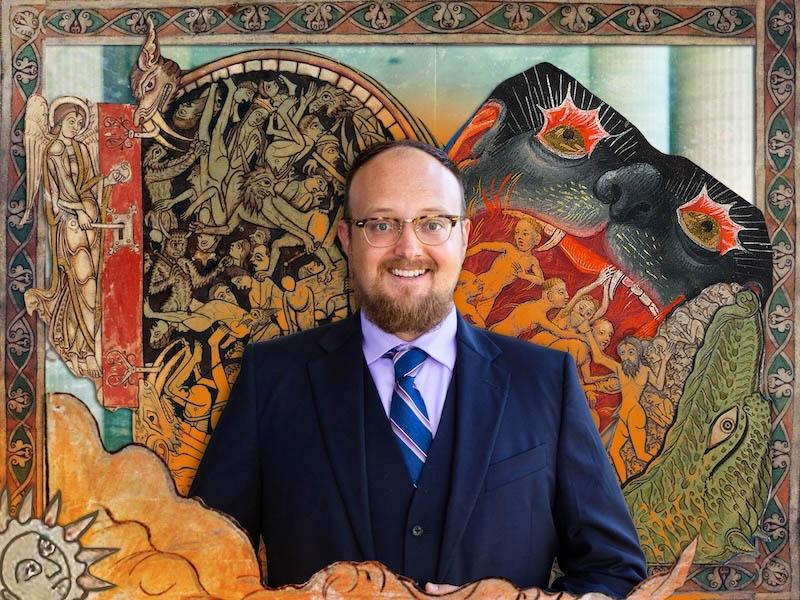English Professor’s Work is the Stuff of Nightmares

Tradition has it that we dress up like demons and devils on Halloween night to ward off evil spirits visiting from the underworld, but how would we recognize those denizens of hell if we were to meet them?
In the forthcoming book, Translating Hell: Vernacular Theology and Apocrypha in the Medieval North Sea, medievalist Stephen Hopkins, an assistant professor in the University of Virginia’s Department of English explores how Medieval texts contributed to Christian visions of hell and its inhabitants and how storytelling played a crucial role in the early expansion of Christianity, as well as the power it still has today.
“There are only about six verses in the entire Bible that are clearly about hell, and my initial question was, how do we get from that handful of verses to something like Dante’s Divine Comedy?,” Hopkins said. “Where do we get all those details?”
The question led him to explore the role of works of ancient Biblical apocrypha, which are works that are not universally accepted as part of the Biblical canon but have been considered important theological texts with a powerful impact on Christian traditions.
One of those works, “The Gospel of Nicodemus,” dates to about the 4th or 5th century A.D. It was so popular in the Middle Ages that it was considered by some to be a fifth Gospel, Hopkins said.
The book includes an account of Christ descending into hell after the crucifixion to liberate many of the virtuous people mentioned in the Hebrew scriptures or the Old Testament. According to Hopkins, the book was extremely influential in shaping a vision of hell that still survives today, but it was also important because it helped answer an important question about the fate of those who lived and died before Jesus’ time.
Hopkins also examines the impact of “The Vision of Saint Paul,” another apocryphal text in which Paul gets a tour of hell and witnesses the consequences of a variety of sins.
“There’s a lot of eye-for-an-eye type justice in that book,” Hopkins said. “That’s where we get a really horrific early glimpse at that idea of hell.”
In his monograph, supported by a $60,000 grant from the National Endowment for the Humanities, Hopkins examines translations of these apocryphal texts into medieval languages like Old English, Old Irish, Middle Welsh and Old Norse to better understand how the idea of hell changed with each translation and how it was customized in ways that made the content more accessible and meaningful for specific audiences.
In effect, Hopkins said, his book is an exploration of theological creativity.
“How do we use stories to reinvent our tradition? Each region does something different with the same idea. They’ve got the same apocryphal texts, and they’ve got a lot of the same theological questions, but they’ve also got different political concerns or concerns about their local identity, or questions that there isn’t a ‘textbook’ answer for,” Hopkins said.
Ultimately, Hopkins finds the nightmarish visions of hell less interesting than the more counterintuitive idea that narratives about hell could be a source of hope.
“You might think of a book about hell as being gloomy and violent, but there are quite a few Medieval texts that depict hell as purgation or as temporary or as something that souls can be rescued from, or hell can be a metaphor for the ways that we can be rescued from the miserable conditions in which we find ourselves in life,” Hopkins said.
“Professor Hopkins’s research explores the deep cultural origins and ongoing implications of our ideas of the afterlife,” said Andrew Stauffer, chair of UVA’s Department of English, “Hopkins asks the kinds of questions that English department faculty are trained to investigate: where did the stories we tell about ourselves and our world come from and what forms did they take? The answers give us new paths forward.”
Hopkins hopes the work will help readers understand the influence of these forgotten texts and competing traditions that have shaped both Christianity and Western culture and the role that storytelling plays in shaping both our beliefs and our values.
“These stories that we tell ourselves about the afterlife have a profound influence on how we see ourselves and others in this life. The way that we work those beliefs out in story form can have profound implications for how we read the world around us, how we decide who belongs and who doesn’t, how we treat those people or whether we even see them as human at all,” Hopkins said.







